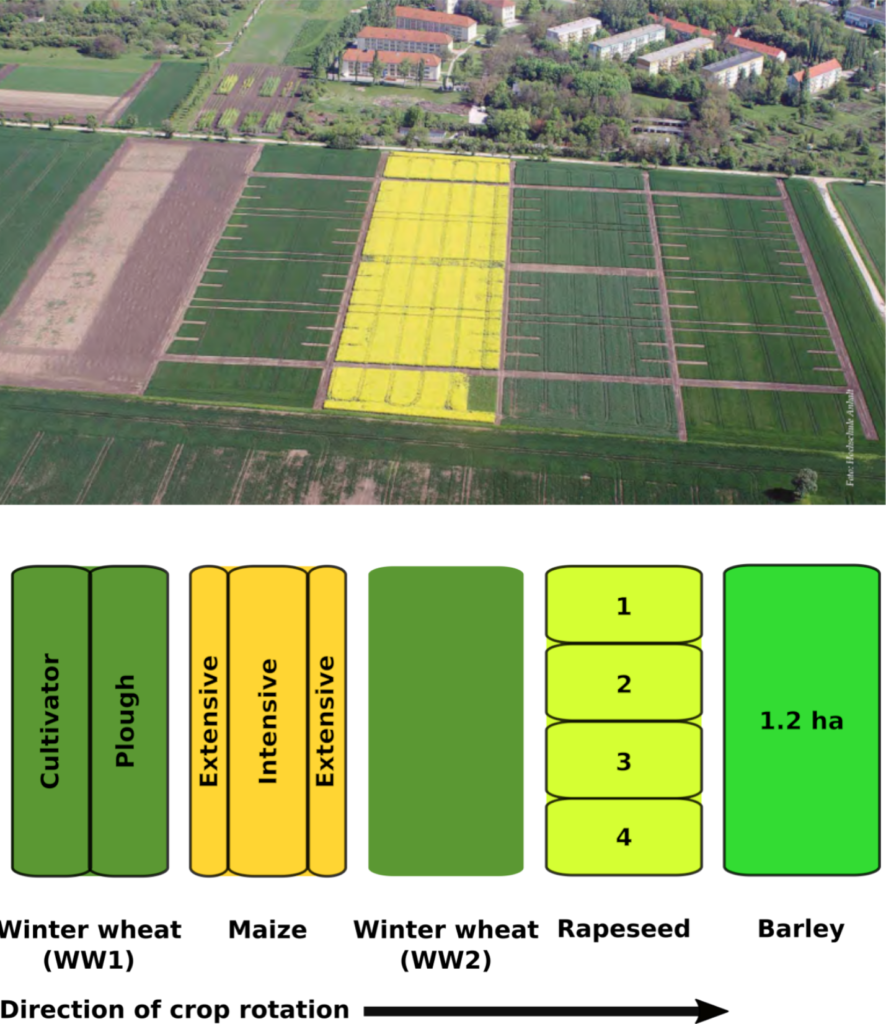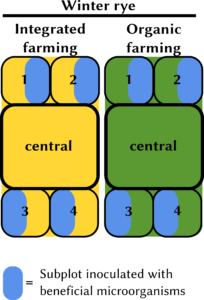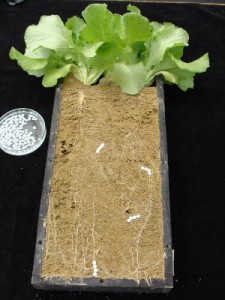Long-term field experiments
The soil acts as the main reservoir for microorganisms colonizing the rhizosphere and these microorganisms play an immense role in maintaining soil and plant health. To make a clearer statement about the influence of different soil types and agricultural practices on soil-microbiota interactions, the DiControl project has focused its approach on two long-term field trials with contrasting soil types and management strategies.
LTE-1 in Bernburg (Germany)
The long-term field trial LTE-1 is located at the Anhalt University of Applied Sciences and was established in 1992 and has had the same test setup ever since. The unique trial design allows us to investigate the impact of the different management factors:
- Fertilization intensity (+/- fungizide, growth regulators)
- Tillage type
- Pre crop
Intensive fertilization represents the amount of N that is commonly used in conventional farming practice. In the extensive treatments, the amount of nitrogen is reduced by 50%. The trial consists of 5 large plots of 1.2 ha (subdivided into 4 replicate plots) each with a rotating crop order: grain maize – winter wheat – winter barley – winter rapeseed – winter wheat. This allows us to investigate the effect of the previous crops maize and rapeseed to the standing crop winter wheat. Each plot is divided into one half under mouldboard plough tillage and one half under cultivator tillage. Within each tillage stripe, two fertilization intensities are studied. The use of root windows allows us to closely look at the interaction between plant, soil and soil microorganisms under field conditions. Furthermore, we are interested in the effect of using beneficial microorganisms on the soil/rhizosphere microbiome, root exudation patterns, plant health, and growth.

HUB-LTE in Thyrow
The long-term field trial HUB-LTE is located at the Humboldt Universität zu Berlin and was created in 2005 to demonstrate the influence of agricultural management practices on soil fertility and yield development. The long-term field trial consists of 16 subplots with 4 different farming systems:
- Old three-field farming
- Improved three-field farming
- Integrated farming
- Organic farming
The DiControl project focuses mainly on the integrated and organic farming plots, which differ mainly in their crop rotation, type of nitrogen fertilization and pesticide use. By comparing the rhizosphere or soil microbiology of integrated and organic cropping systems, we aim to determine the extent to which different farming strategies shape microbial communities and thereby influence plant growth and health. We are also analyzing the effects of inoculation with a consortium of beneficial microbes on soil microbiota as well as the plant physiology and gene expression.

DOK-LTE in Therwil (Switzerland)
Since 1978, the DOK-LTE in Therwil has compared biodynamic (D), organic-biological (O) and conventional (K) cultivation of crops such as wheat, potatoes, corn, soybean or clover-grass at the same site. The long-term field experiment belongs to the Research Institute of Organic Agriculture (FiBL) and the Swiss center of excellence for agricultural research Agroscope. The DiControl team investigated the extent to which different compositions of soil microbiota influence the root exudation of lettuce grown in DOK-LTE soils under controlled conditions and thereby the accumulation of plant pathogens.
